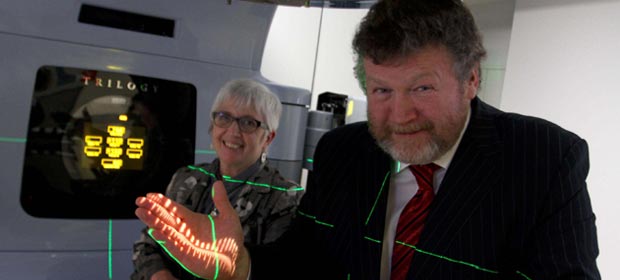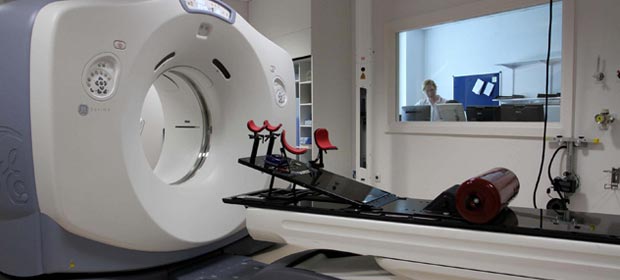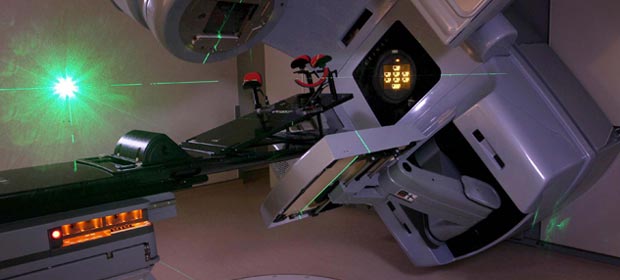The Minister for Health, Dr. James Reilly, T.D., has officially opened the two new National Cancer Control Programme St Luke’s Radiation Oncology Centres at Beaumont and St James’s Hospitals. The launch took place at the St Luke’s Radiation Oncology Centre in Beaumont Hospital.
The Minister has also launched the St Luke’s Radiation Oncology Network, which operates across the three sites at Rathgar, Beaumont and St James’s Hospitals.

With an overall investment of €60m, the two new centres have the latest state of the art radiation oncology services – on a par with the most sophisticated available internationally. Developed by the National Cancer Control Programme, the new centres will ultimately increase radiation oncology treatment capacity in the east of the country by 50 per cent. For some patients the development will eliminate the need to travel abroad for services that will be available in Ireland for the first time.
Although this specific project was initiated with the establishment of the NCCP in 2007, much of the analysis and planning began over a decade ago. The two centres were completed and became operational in 2011. Over 500 specialist and support staff now work across all three centres in the network, with the NCCP having recruited 54 new staff over the past two years – including radiation therapists, physicists and clinical engineers. There has been significant investment in medical staff, bringing the total number of Consultant Radiation Oncologists across the network to 16. Over 4,000 patients were treated across all three centres in 2011.
Each new centre features four new state of the art treatment linear accelerators as well as two CT scanners and one MRI unit. The linear accelerators (each representing an investment of well in excess of €1m) differ slightly in their specifications. On the Beaumont site the specifications include an intra cranial stereotactic radiotherapy service operated in conjunction with the National Referral Centre for Neurosurgery. The St James’s centre houses a unit capable of delivering Total Body Irradiation for haematology patients attending the National Stem Cell Transplantation Centre.
The availability in the two new centres of Rapid Arc Intensity Modulated Radiotherapy (IMRT) for public patients also marks a significant development. Currently being used for the treatment of prostate cancer, Rapid Arc treatment technology allows precise delivery of the radiotherapy dose to the target area. It is designed to reduce the dose to nearby normal tissues and reduce the probability of side effects when compared with standard radiotherapy planning techniques.
According to Dr. Jerome Coffey, NCCP National Clinical Lead, Radiation Oncology, “This is a big advantage, particularly in cases where a high dose of radiation is required to treat a tumour that is close to normal organs.” A previous version of IMRT has been successfully used in St Luke’s Hospital in Rathgar for several years, but the addition now of the Rapid Arc treatment in the new centres improves the patient experience and allows for more patients to be treated. In the treatment of head and neck cancer in particular, treatment times each day are reduced by up to 80 per cent.”
Dr. Susan O’Reilly, Director NCCP, said the opening of the two new centres marked a “hugely significant” milestone for the programme. Acknowledging the many individuals who had contributed to the developments including Prof. Donal Hollywood and Prof. Tom Keane, Dr. O’Reilly said that in aspiring to provide world class cancer services, the creation of the St Luke’s Radiation Oncology Network showed how Ireland was matching the best.
Noting that since 2007, the NCCP had opened and consolidated 25 rapid access clinics at the eight designated cancer centres, Dr. O’Reilly pointed to the average primary cancer detection rate of over 35 per cent at the rapid access lung and prostate clinics. Dr. O’Reilly also commented on how, on average, 99 per cent of all urgent breast cancer cases were being seen within a two week timeframe, (exceeding the 95 per cent target rate) in the eight (plus the satellite in Letterkenny) breast cancer clinics. Dr. O’Reilly said that commitments were being met, better services being delivered and added that “all of which means better outcomes for our patients.”
With a projected growth of over 100 per cent in the numbers of cancers detected over the coming decade, Dr. O Reilly said it was essential that services continued to be developed and expanded. Commenting on the next phase of the national radiation oncology programme, she said that this would mean significant developments at the designated cancer centres in Cork and Galway. The NPRO plan will allow for investment in new radiation oncology equipment and facilities at both centres. Dr. O’Reilly acknowledged the announcement of funding for this phased development by the Minister last year.
Confirming that €175m will be spent on the development of the radiation oncology services in Cork and Galway – along with continued phased development of the centres in Dublin – over the coming five years, the NCCP Director said that it was clear that the commitment to cancer services was strong and evident.
She added that the NCCP and the Department of Health continue to liaise closely with the Northern Ireland authorities in the development of the new radiation oncology centre at Altnagelvin Hospital, Derry, providing cross border access for patients in the north west.
She said our survival rates in this country could improve by up to ten per cent if we successfully implement well organised cancer control systems



